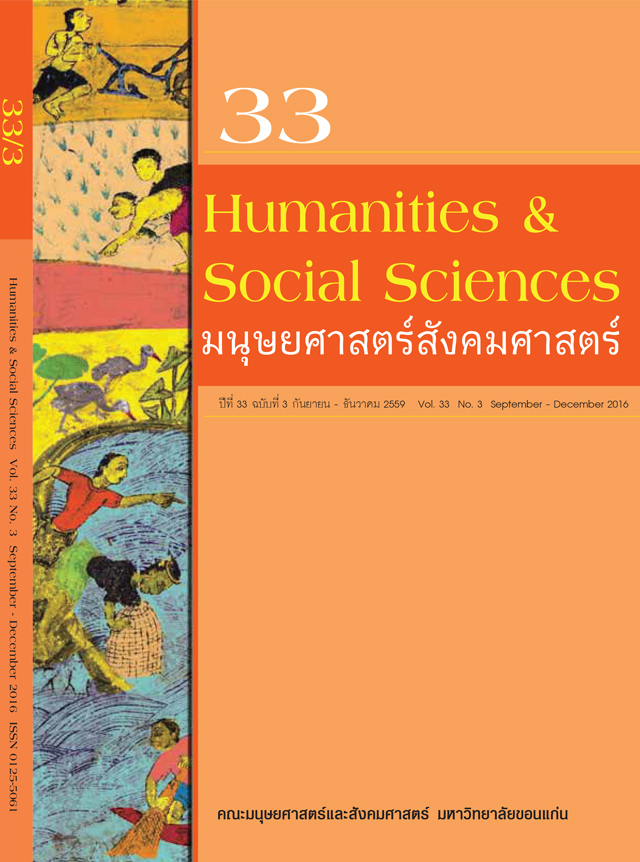พิธีกรรมการคอบผีเรือนในประเพณีการแต่งงานของเผ่าเม้ย ที่นครหลวงเวียงจันทน์ สปป.ลาว; The Worship of House Spirits ( Kop phi huan) in the Marriage Rituals of Meuy People in Viengchan City, Lao PDR.
Keywords:
ชนเผ่าเม้ย, การแต่งงาน, พิธีกรรมคอบผีเรือน, Meuy people, Marriage rituals, “Kop Phi Huan”, Worship of ancestral spiritsAbstract
This research is about the worship of house spirits, focused on marriage rituals of the Meuy people who live in Baan Thaxang in the Pakghum District, and Baan Phonethong and Baan Paksapmai in the Xaythany District of Viengchan city. This study was done by using a qualitative research method, by collecting data in the field, by observation, by interview and focus group discussion and study of relevant literature. The result found that:
The house spirits (ancestral spirits), are ghosts of parents and grandparents that have passed away. Every house has a Honghong, the room for spiritual activities. House spirits (called “phijae”) are invited into the house by performing a ritual and are consulted when something happens with a family member such as a wedding, which “Kop phi huan” has to be done prior to all other rituals, and can’t be omitted. The purpose is to respect their ancestors and deep inside, the Meuy people are driven by the belief, that their ancestors can influence their lives, and give good or bad luck. If these traditions are not followed, Meuy people believe that the married couple will encounter bad luck in their married life, such as illness. If the traditions are followed, the married couple will receive blessings from the ancestral spirits, and they will have good fortune and stay out of harm’s way.
บทคัดย่อ
บทความวิจัยเชิงคุณภาพนี้ มีวัตถุประสงค์เพื่อศึกษาพิธีกรรมการคอบผีเรือนในประเพณีการแต่งงานของชนเผ่าเม้ย พื้นที่ศึกษาคือ บ้าน ท่าช้าง เมืองปากงึ่ม บ้านปากซาบใหม่และบ้านโพนต้อง เมืองไชยธานี นครหลวงเวียงจันทน์ วิธีการศึกษาคือ ศึกษาข้อมูลจากเอกสาร และ ภาคสนาม โดยวิธีการ สัมภาษณ์เชิงลึก การสังเกตุแบบมีส่วนร่วมและไม่มีส่วนร่วม วิเคราะห์ข้อมูลโดยวิธีพรรณวิเคราะห์
ผลการศึกษาพบว่า ผีเรือนหมายถึงผีบรรพบุรุษที่เป็นผีของพ่อแม่ ปู่ย่า ตายายที่ล่วงลับไปแล้ว วิญญาณผู้ตายได้รับการอันเชิญผ่านพิธีกรรม ที่เรียกว่า “ผีแจ” มาไว้ที่ห้องหองเรียกว่า ห้องผีเรือน สถานที่ทำพิธีกรรมต่างๆของแต่ละครอบครัว การคอบผีเรือน หมายถึง “การบอกกล่าว” แก่ผีบรรพบุรุษเมื่อมีเหตุการณ์ใดเหตุการณ์หนึ่งเกิดขึ้นในครอบครัว เช่น กรณีการแต่งงาน อีกนัยหนึ่งการคอบผีเรือน หมายถึงแสดงความเคารพต่อวิญญาณบรรพบุรุษ ที่ชนเผ่าเม้ยเชื่อว่า การประกอบพิธีกรรมทุกอย่างของญาติพี่น้องต้องให้ผีบรรพบุรุษรับรู้เหมือนตอนที่ยังมีชีวิดอยู่ และ เชื่อว่าถ้าไม่ประกอบพิธีกรรมอย่างนั้น จะทำให้คู่แต่งงานใหม่เกิดการเจ็บป่วยหรือมีอันเป็นไปในทางร้าย แต่ถ้าได้ทำการคอบผีตามประเพณีคู่แต่งงานใหม่จะได้รับพรจากดวงวิญญาณบรรพบุรุษ ทำให้ชีวิตคู่มีความความโชคดี ไม่มีอันตรายเกิดขึ้นได้ ดังนั้นสังคมเม้ยเมื่อมีการแต่งงานจะต้องได้ทำพิธีกรรมคอบผีเรือนก่อนเป็นอันดับแรก



